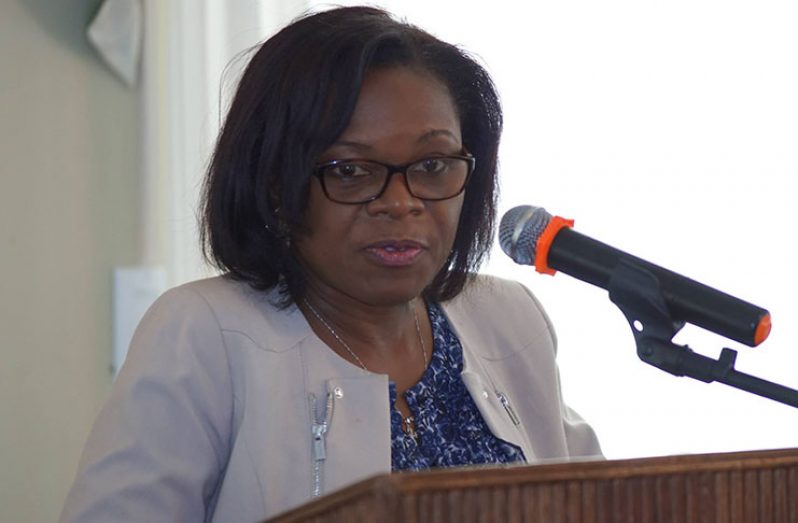— two such tests endorsed by WHO, says Deputy CMO
By Navendra Seoraj
THE introduction of rapid testing could be a “game changer” in the fight against the Novel Coronavirus (COVID-19) pandemic, as this method will allow health authorities to conduct more tests and diagnose persons quicker.
Guyana could soon see the introduction of this method of testing, now that the World Health Authority (WHO) has endorsed two models of rapid testing, said Deputy Chief Medical Officer (DCMO), Dr. Karen Boyle.
As it is now, Guyana is using the Polymerase Chain Reaction (PCR) method to test persons for COVID-19. And, according to health authorities, this type of testing is done in a laboratory and it takes about seven hours to produce results.
The likelihood of rapid tests supplementing the PCR method is high, but will most likely be introduced by private institutions first.“The Ministry of Public Health is willing to partner with private agencies once they are in a position to provide quality testing… the only types of the test we are willing to accept right now is PCR, but we noticed that WHO has endorsed rapid diagnostic test, today (Sunday),” said Dr. Boyle.
She said the WHO has endorsed two rapid testing models, and it is expected that, with this endorsement, the ministry will be willing to consider those models of rapid testing.
“Once they (private institutions) bring those diagnostic kits in, we can test it because once the WHO endorses it we won’t have a problem,” said Dr. Boyle.
RELATED:
Earlier this month, the WHO had said multiple diagnostic test manufacturers have developed and begun selling rapid and easy-to-use devices to facilitate testing outside of laboratory settings.
The international health organisation said these simple test kits are based either on detection of proteins from the COVID-19 virus in respiratory samples (e.g. sputum, throat swab) or detection, in blood or serum, of human antibodies generated in response to infection.
“However, before these tests can be recommended, they must be validated in the appropriate populations and settings. Inadequate tests may miss patients with active infection or falsely categorise patients as having the disease when they do not, further hampering disease control efforts,” said the WHO.
At that time, the WHO had only recommended the use of these new point-of-care immunodiagnostic tests in research settings, noting that they should not be used in any other setting, including for clinical decision-making, until evidence supporting use for specific indications is available.
Dr. Boyle confirmed that this method of testing was not used in the past for reasons stated by WHO, but when asked if the Ministry of Public Health will be looking at the possibility of utilising the new method in public institutions, the DCMO said it is a possibility which will be explored, since it will allow them to do point-of-care-testing. This means that persons can be tested on the spot instead of sending samples to the National Reference Laboratory.
LOT OF POSSIBILITIES
“A lot of possibilities can be opened up with this,” said Dr. Boyle, adding that the new mobile testing units can even be utilised for actual testing instead of just sample collecting, once the rapid-testing kits are acquired.
The Guyana Chronicle reached out to Resident Pan American Health Organisation (PAHO)/WHO Representative, Dr. William Adu-Krow, to shed some more light on the new development, and while he said he has seen the document from WHO, Dr. Adu-Krow said he needs further clarity from the WHO’s head office.
“WHO has always endorsed rapid testing for research, but not for diagnostic testing…so I reached out to Washington for more clarity on this,” said the representative.
However, when asked about the potential impact of rapid testing, Dr. Adu-Krow said it would be a “game changer” in the fight against the pandemic, since testing would be done anywhere in Guyana. Local health authorities have so far tested 455 persons, of which 74 were positive and 381 were negative.
There is no optimal testing rate, since it would vary for different countries, but Dr. Adu-Krow had said that Guyana’s is about 20-25 per cent, which is what obtains globally. This means that if 100 persons are tested, 25 per cent would be positive.
“If you open it up too wide, you would be testing a 1,000, and only get 20; so you will be wasting test kits… On the other hand, if you are too rigid, you will be testing 10, and eight are positive. But you will be missing a lot,” Dr. Adu-Krow said.
As things stand now, Guyana, according to WHO guidelines, is within range for testing, but according to Dr. Adu-Krow, if needs be, the range “could be widened a little more”.
There could, however, be a natural widening of the testing range, since private institutions were given the “green light” to test for COVID-19 and treat infected persons. And, PAHO has since expressed its willingness to assist private institutions in preparing themselves to test for the disease.
PAHO SUPPORT
The international health organisation had “brought in” an expert to train technicians at the reference lab to test for the COVID-19 disease.
“We are prepared to train other ‘labs’ and private hospitals to have the same quality assurance as the reference ‘lab’; they will have to go by the standards we have set up for the government,” said Dr. Adu-Krow.
He said that PAHO normally supports Guyana by supporting the Ministry of Public Health, and they will continue to do so by giving them testing kits and now by supporting private institutions, which will have to follow WHO guidelines.




.jpg)










